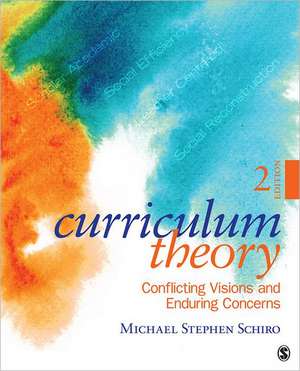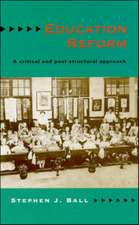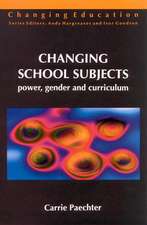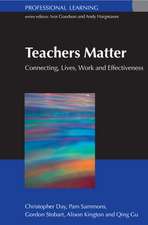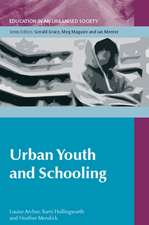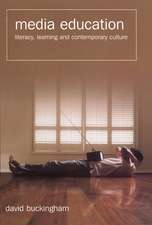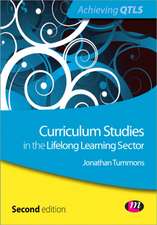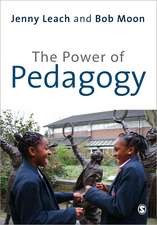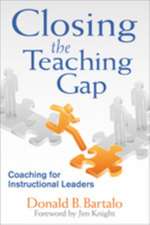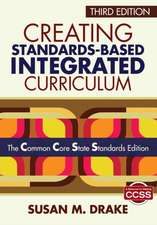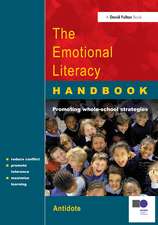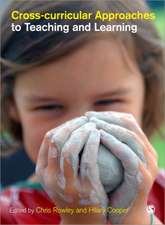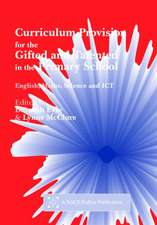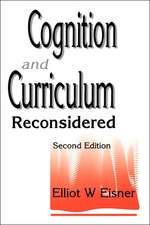Curriculum Theory: Conflicting Visions and Enduring Concerns
Autor Michael Stephen Schiroen Limba Engleză Paperback – 12 iun 2012
Additional historical material on the Scholar Academic ideology is added in Chapter 2.
In Chapter 2, the section on teaching was reorganized and a new subsection is added on Teachers as Transmitters, Mediators, or Translators.
Several new sections are added to Chapter 4 on the Learner Centered ideology: The major section provides a description and analysis of a Learner Centered curriculum. Others include things such as a discussion the relation between knowledge and experience, and the nature and structure of the learning environment of the ideology.
Several sections of Chapter 4 have been reorganized under new headings to add clarity to the chapter.
Seven new sections have been added to Chapter 6: Six of these sections are plays in which four teachers discuss their beliefs about enduring curricular issues and related current "hot" curriculum topics, in ways that highlight the differences between the ideologies.
An additional section in Chapter 6 discusses differences in how each of the ideologies takes advantage of the use of technology in curriculum and during instruction.
| Toate formatele și edițiile | Preț | Express |
|---|---|---|
| Paperback (1) | 537.40 lei 3-5 săpt. | +21.43 lei 6-12 zile |
| SAGE Publications – 12 iun 2012 | 537.40 lei 3-5 săpt. | +21.43 lei 6-12 zile |
| Hardback (1) | 1212.10 lei 6-8 săpt. | |
| SAGE Publications – 11 noi 2007 | 1212.10 lei 6-8 săpt. |
Preț: 537.40 lei
Preț vechi: 726.21 lei
-26% Nou
Puncte Express: 806
Preț estimativ în valută:
102.83€ • 109.96$ • 85.74£
102.83€ • 109.96$ • 85.74£
Carte disponibilă
Livrare economică 28 martie-11 aprilie
Livrare express 13-19 martie pentru 31.42 lei
Preluare comenzi: 021 569.72.76
Specificații
ISBN-13: 9781412988902
ISBN-10: 141298890X
Pagini: 320
Ilustrații: Illustrations
Dimensiuni: 187 x 232 x 16 mm
Greutate: 0.54 kg
Ediția:Second Edition
Editura: SAGE Publications
Colecția Sage Publications, Inc
Locul publicării:Thousand Oaks, United States
ISBN-10: 141298890X
Pagini: 320
Ilustrații: Illustrations
Dimensiuni: 187 x 232 x 16 mm
Greutate: 0.54 kg
Ediția:Second Edition
Editura: SAGE Publications
Colecția Sage Publications, Inc
Locul publicării:Thousand Oaks, United States
Cuprins
Preface
Acknowledgments
Chapter 1: Introduction to the Curriculum Ideologies
Chapter 2: Scholar Academic Ideology
Chapter 3: Social Efficiency Ideology
Chapter 4: Learner Centered Ideology
Chapter 5: Social Reconstruction Ideology
Chapter 6: A Comparative Overview of the Curriculum Ideologies
Chapter 7: Individual Perspectives on the Curriculum Ideologies
Appendix: Curriculum Ideologies Inventory
References
Index
About the Author
Acknowledgments
Chapter 1: Introduction to the Curriculum Ideologies
Chapter 2: Scholar Academic Ideology
Chapter 3: Social Efficiency Ideology
Chapter 4: Learner Centered Ideology
Chapter 5: Social Reconstruction Ideology
Chapter 6: A Comparative Overview of the Curriculum Ideologies
Chapter 7: Individual Perspectives on the Curriculum Ideologies
Appendix: Curriculum Ideologies Inventory
References
Index
About the Author
Notă biografică
Descriere
A clear, unbiased, and rigorous description of the major curriculum philosophies that have influenced educators and schooling over the last century.
Recenzii
"Provides readers with a clear, sympathetic and unbiased understanding of the four conflicting visions of curriculum that will enable them to more productively interact with educators who might hold different beliefs. The book stimulates readers to better understand their own beliefs and also to provide them with an understanding of alternate ways of thinking about the fundamental goals of education" —SIRREADALOT.ORG
"Schiro (Boston College) has written a text that examines curriculum theory for experience and pre-service educators with the purpose of understanding educational philosohpies or ideologies that they are likely to encounter in their teaching."
"Not only are the chapters extremely comprehensive, the organization of the book is extremely thoughtful and provides a variety of activities for the neophyte and experienced teacher."
“This is the perfect book for both undergraduate and 'graduate' students of education and curriculum studies (yes, graduate students!). In fact, it is one of the best books I have read detailing the four main `ideologies' of curricula, namely, the Essentialist, the Social Efficiency, the Progressive, and the Social Reconstruction models of curriculum.
The back of the book contains the following quotation: "A clear, unbiased, and rigorous description of the major curriculum philosophies that have influenced educators and schooling over the last century..." It is all of this, and more!
(1) It is written to appeal to theorists (academics) and practitioners. Although it is a thorough and in-depth study of the ideologies, it is devoid of dense, academic jargon; the idiom is clear, direct, and accessible (all technical terminology is thoroughly explained). E.g., students and practitioners having difficulty with the convoluted writings of contemporary scholars of curriculum, will find this book a welcome change!
(2) It adopts a `historicist' approach to the presentation of its subject-matter, which means that the author defines and analyzes the various `ideologies' in light of their contextual emergence and importance. This book is not simply presenting `facts' for memorization; the positions `live,' as it were, as historical realities!
(3) It provides the rigorous foundational knowledge needed in order for students to truly grasp the writings of contemporary philosophers of education and curriculum studies, e.g., when juxtaposing these `ideologies' a student sees more clearly `why' it is that proponents of the `scholar academic ideology' are opposed to the `child-centered ideology.' This allows the student to situate the views of Adler and Dewey within a legitimate historical context, which emerge as a product of a particular ideological world-view, of which education and curriculum are inextricably a part.
If you're a curriculum planner, evaluator, advocate, developer, or burgeoning theorist, you must have this book! “
"Schiro (Boston College) has written a text that examines curriculum theory for experience and pre-service educators with the purpose of understanding educational philosohpies or ideologies that they are likely to encounter in their teaching."
"Not only are the chapters extremely comprehensive, the organization of the book is extremely thoughtful and provides a variety of activities for the neophyte and experienced teacher."
“This is the perfect book for both undergraduate and 'graduate' students of education and curriculum studies (yes, graduate students!). In fact, it is one of the best books I have read detailing the four main `ideologies' of curricula, namely, the Essentialist, the Social Efficiency, the Progressive, and the Social Reconstruction models of curriculum.
The back of the book contains the following quotation: "A clear, unbiased, and rigorous description of the major curriculum philosophies that have influenced educators and schooling over the last century..." It is all of this, and more!
(1) It is written to appeal to theorists (academics) and practitioners. Although it is a thorough and in-depth study of the ideologies, it is devoid of dense, academic jargon; the idiom is clear, direct, and accessible (all technical terminology is thoroughly explained). E.g., students and practitioners having difficulty with the convoluted writings of contemporary scholars of curriculum, will find this book a welcome change!
(2) It adopts a `historicist' approach to the presentation of its subject-matter, which means that the author defines and analyzes the various `ideologies' in light of their contextual emergence and importance. This book is not simply presenting `facts' for memorization; the positions `live,' as it were, as historical realities!
(3) It provides the rigorous foundational knowledge needed in order for students to truly grasp the writings of contemporary philosophers of education and curriculum studies, e.g., when juxtaposing these `ideologies' a student sees more clearly `why' it is that proponents of the `scholar academic ideology' are opposed to the `child-centered ideology.' This allows the student to situate the views of Adler and Dewey within a legitimate historical context, which emerge as a product of a particular ideological world-view, of which education and curriculum are inextricably a part.
If you're a curriculum planner, evaluator, advocate, developer, or burgeoning theorist, you must have this book! “
